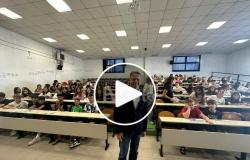
Due to a feverish state, the Guarantor of people deprived of personal liberty of the Province of Benevento, Patrizia Sannino, was unable to take part in the demonstration called at the “La Pace” Center of the Sannite capital on the conditions of life in prisons and for the rehabilitation of the prison system.
The Representatives ofAssociation “The social network“, who together with numerous others had announced and cooperated in the initiative, read the text of a document drawn up by Conference of Guarantors of Prisoners’ Rights to raise public and political awareness of the tragic sequence of suicides within the walls of penitentiaries.
This is the text:
“Three months have now passed since the appeal “Urgent interventions are needed for overcrowding and suicides in prisons”, in which the President of the Republic invited the political class of our country to urgently adopt immediate measures to ease the climate of tension that reigns in the Italian prisons, caused mainly by overcrowding, staff shortages and inefficiency of intramural healthcare.
With great concern, we note, once again, the substantial indifference of politics towards the worsening state of suffering of prisoners, towards the worsening of the living conditions of our prisons which, far from allowing that “realisation of the constitutional face of punishment ”, continue to betray the basic European and international constitutional principles on which the rule of law rests and to continually humiliate the human dignity of restricted people.
For the National Conference of Territorial Guarantors of Persons Deprived of Liberty it is essential that the legislator immediately identifies measures, even temporary, aimed at easing the tension on the prison population. It is urgent first of all to start from the discussion and approval of deflationary measures overcrowding, easily applicable, such as that contained in the proposal of the Hon. Giacchetti, as the first signatory, aimed at modifying the institution of early release and providing a discount of an additional thirty days per semester for the next two years, compared to reductions already granted from 2016 to today (30+45).
It is then necessary to begin to implement a model of criminal execution that distances itself as much as possible from the carcinocentric vision of the punitive system. Which would already be possible, with current legislation, through greater usability by restricted people alternative measures to detention: as of June 10, 2024 are 23,443 people with a remaining sentence of less than three years, of which 7,954 with a residual sentence of less than one year; I am 1,529 prisoners who have a sentence imposed from 1 month to 1 year.
It is fundamental, then, ensure that prison ceases to be that place of “affective desertification”, immediately following the decision of the Constitutional Court which declared the constitutional illegitimacy of the provision of the penitentiary system which prohibits the holding of intimate and confidential emotional encounters in prison. Decision no. 10 of 2024, in fact, demonstrates how the protection of the inviolable right to cultivate one’s affections cannot stop in front of an ‘armoured’ cell, which is not (nor can it become) a border, in its own way, for constitutional legality or a confinement for the human dignity of people. We are convinced that penitentiary institutions will understand the value of this innovation, for the work they do every day in building resocializing paths. Just as we are equally convinced that the supervisory judiciary will not wait for someone else to solve the problem, because the Constitutional Court has also delegated them to resolve this problem. Furthermore, it is essential increase phone calls, because this represents a further way to protect the intimacy of the inmates’ affections and ease the climate of tension that exists in the different sections of the Italian institutes. Finally, the supervisory judiciary needs to increase the number of days premium permit for restricted access and a way is found to make the process of granting such permits more efficient and timely, especially for those of strict necessity.
Politics must then take charge of the problems linked to the growth in a more targeted way mental distress in penitentiary institutions, a topic that must be addressed immediately and which we have guiltily wanted to leave out.
Particular attention, in fact, must be paid to people with addictionswhich as of 10 June 2024 were 17,405 in Italian prisons, and for whom rehabilitation needs almost never prevail over security reasons. It is necessary to increase alternative measures for them in therapeutic communities, but also in foreign prisonerspresent in 19,304 to 10 June, who struggle more than others to have their fundamental rights protected within prison, to have access to social welfare benefits and who, for the most part, find themselves in conditions of absolute social poverty.
Just as specific attention must be paid to the condition of people affected by it serious mental disorders who, despite having the right to access one REMS – a right, often established by the supervisory judiciary – find themselves serving their sentences in prison, due to the still too long waiting lists for these rehabilitation facilities. I am 38as of June 10, people on the waiting list for a REMS.
This dramatic condition, among other things, is exposing our country to various sentences from the ECHR from 2022 to today (see: ECHR Sy v. Italy, which became final in April 2024; the decision of 20 March 2024, with which the ECHR has issued a precautionary measure in favor of a psychiatric patient currently detained in the Rebibbia Femminile prison, ordering the Italian Government to “transfer the appellant without any further delay to a REMS or other facility where she can be given therapeutic treatment appropriate to her psychopathological condition”; see also the Ciotta v. Italy case still pending). Finally, equal attention must be paid to the many prisoners, suffering from serious mental distress and/or even supervening mental illness, who find themselves serving their sentences in common sections and not in psychiatric units or under so-called home detention. in derogation.
And then the dramatic chapter of suicides in prison. A suicide every three days!
Suicides are both the product of the distance of politics and civil society from prison and of the lack of socio-health and listening figures in the institutions, considering that those who commit suicide or attempt suicide are in most cases those who have recently entered prison. prison or who should leave, but are not accompanied at this stage.
In addition to this, there is one last aspect that worries the community of territorial guarantors: the slow slide of penitentiary policy from social policy to purely security policy.
If already under current legislation the prisoners, “the last of the last” of our society, are not listened to, what will happen in the event of approval of the Bill, now in the Justice Commission, on the subject of “Public safety, protection of personnel in service as well as victims of usury and penitentiary order” which provides for the introduction of an ad hoc type of crime, aimed at sanctioning revolts by prisoners, even those carried out in passive forms? Criminalizing forms of resistance by prisoners (even just three of them), such as refusal of food or failure to return from free time, is in some ways paradoxical, synonymous with a “supervise and punish” vision and strongly contrasting with the European and international constitutional principles regarding the penitentiary system. Just as we hope that the decree that has already (!) established the Operational Intervention Group (GIO) to quell such riots in prisons, may be soon amended.
We firmly believe that a State that resorts too casually to criminal sanctions and repression is not a strong State but a weak State.
The State is strong, capable of intercepting social hardship and adopting the most appropriate social measures to protect the dignity of all people, even and above all in prison.
And to do this, we do not need new penitentiary institutions, further criminal sanctions, a security state, but a social state that is always present in prison and which, through targeted investments in treatment activities (cultural, sporting, recreational , at school, at work), knows how to ensure that detention time makes sense and is functional to the social reintegration of people, as our Constitutional Charter requires.
To always protect human dignity.“





